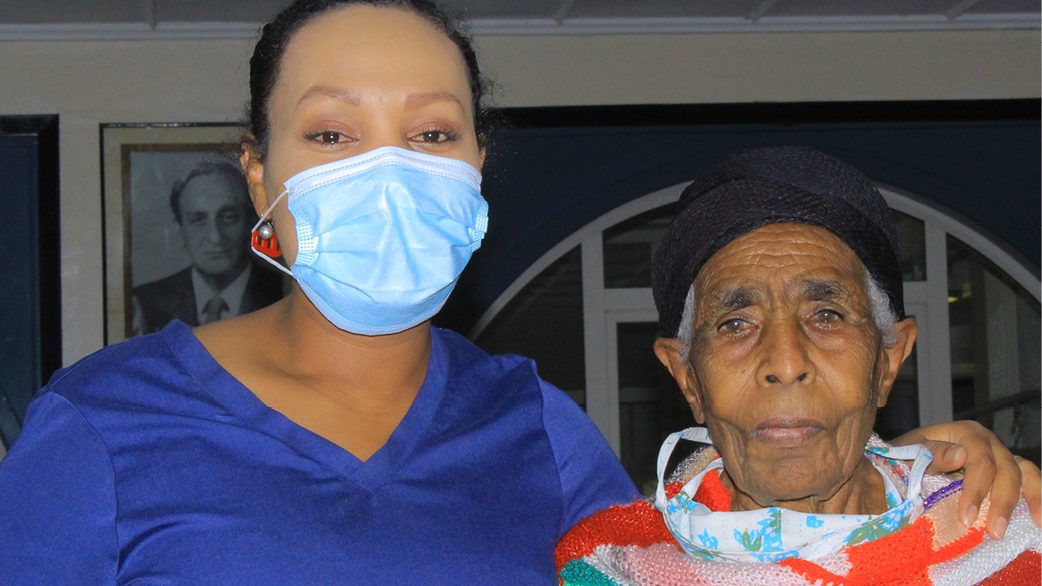Can you imagine discovering that you are pregnant with your second child? Imagine the anticipation as you and your loved ones prepare to welcome a new addition to your family. Imagine waiting for days in excruciating pain as you suffer an obstructed labor without the help of a midwife or medical professional. Imagine traveling, almost unconscious, on a homemade stretcher for hours as you are carried to the nearest clinic, where your child is heartbreakingly stillborn. Imagine waking up and realising the ordeal is not over, and that you constantly leak urine now because of an injury, called obstetric fistula, that you suffered in childbirth.
This was Bijige’s reality.
In the small, isolated village in southern Ethiopia which Bijige called home, a medical clinic was considered a luxury. So, when Bijijge experienced a complicated labor, there was no one who could help her. After two agonizing days of obstructed labor, Bijige was carried, unconscious, to the closest medical clinic.
Bijige was lucky to be alive. Heartbreakingly, her baby was stillborn. When she awoke at the hospital, Bijige realized that her ordeal was not over: she was incontinent. “When I woke up, I found myself lying on a soaked bed and asked the nurses what happened,” says Bijiige. The local clinic assured her that her condition would stop after a while.
It never did.
What is fistula?
Obstetric fistula is one of the worst things that can happen to a woman or girl. It is a hole between the birth canal and the bladder or rectum, and leaves the patient leaking urine or feces – sometimes both. This internal injury is caused when a woman experiences a difficult or obstructed labor without any medical help. In places like Ethiopia, over 70% of women end up giving birth without a medical professional’s help – as a result, an estimated 31,000 women in Ethiopia are currently suffering from the indignity and trauma of fistula.
Hamlin Fistula Ethiopia established the world's first modern fistula hospital – Hamlin’s Addis Ababa Fistula Hospital – with the goal of eradicating this condition.
The reality of fistula
For almost 40 excruciating years, Bijige was incontinent. “I returned home with a heavy heart and grief. Day in, day out, my situation never changed at all. Urine flows uncontrollably while I walk, sit and sleep,” says Bijige. The impact of her fistula went beyond her physical injury: her husband left her, and she had to move back to her father’s home and raise her daughter alone. Because of her incontinence, Bijige was cut off from her community. “I felt ashamed of myself and wished I could die, rather than live in such agony,” recalls Bijige.
“Because of this injury, I never even attended my daughter’s wedding properly. I was completely dependent on my father and my daughter. Throughout that time, I started to believe that I would live with it forever and became completely hopeless.”

A cure for Bijige
Depressed and isolated, Bijige had given up hope of a cure for her fistula injury after three decades of suffering – until she learned of Hamlin Fistula Ethiopia. When she arrived at Hamlin’s Addis Ababa Fistula Hospital, Bijige was embraced with open arms and respect.
“I am inside this beautiful hospital with lovable staff who give unconditional love and care for every one of us. I just regret that I didn’t know about the hospital earlier,” reflects Bijige.
The surgery to repair the fistula injury that had grieved Bijige for decades, took only a few hours. One week after her fistula-repair surgery, Bijige was ready to be discharged.
For the first time in nearly 40 years, Bijige was dry.
“Although I am an old woman and close to my grave, my cure means a lot to me. I will live the rest of my life without being anguished, ashamed and depressed. I thank God and every single one of you here at the hospital for letting me see the impossible become possible. You are life givers,” exclaims Bijige.
We can eradicate fistula
Too many women like Bijige suffer needlessly because of fistula – but that doesn’t have to be the case. This childbirth injury can be eradicated – and we need your help this Giving Tuesday. With a community of generous supporters committed to creating change in women’s lives, fistula will be eradicated and we will achieve Hamlin’s vision of a fistula-free Ethiopia.
Thanks to the generosity of people like you, Bijige is excited to start a new chapter in her life.
A standard fistula repair surgery costs just $900 and restores a woman's health and dignity. This Giving Tuesday, you can help treat seven more women like Bijige by donating here.